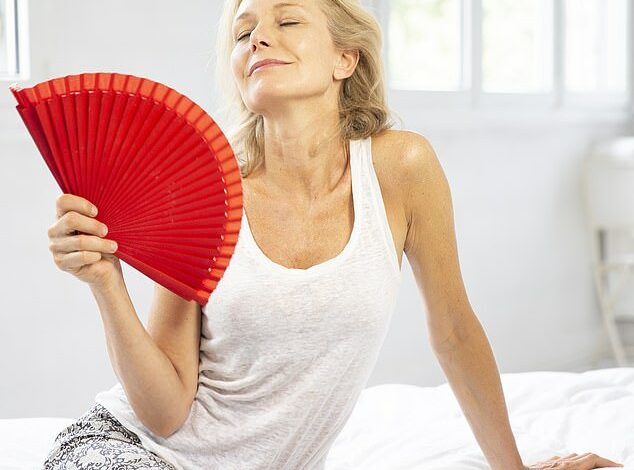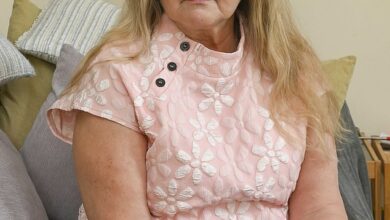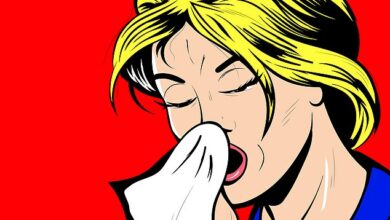DR MAX PEMBERTON: This is one of the reasons why women feel anxious during menopause… and HRT doesn’t fix it




Fortunately, there has been a significant change in the attitude of many physicians toward hormone replacement therapy (HRT). It will come as no shock to most women reading this that peri- and post-menopausal women have had to fight for far too many years for their right to access this drug.
Finally, more and more doctors are opening up to the idea that prescribing HRT can have real benefits for their patients – and no doubt this has made a life-changing difference for many women.
Although 13 million women in Britain go through the menopause, it is estimated that one in four will need to visit their GP at least three times before receiving appropriate treatment.
Last year’s official draft guidance, which advised GPs to consider alternative treatments such as talking therapies ‘in addition to or as an alternative to’ HRT to help reduce the symptoms of menopause – such as insomnia, depression and hot flushes – has now been revised.

Dr. Max believes that low mood and anxiety during menopause are the result of complex social and psychological factors, rather than simple biology.
Health officials pushed back after accusations of ‘medical misogyny’, with the implication that menopause symptoms were ‘all in the mind’.
Indeed, NICE changed its guidelines this week and advised that HRT should be offered as the first line of treatment.
You would think this would be a positive development, but I’m not sure. Regular readers will know that I am a big fan of HRT and have seen many patients’ lives transformed by it, but HRT is not for everyone and talking therapies can help women with symptoms that have a psychological component.
For example, many women talk about no longer feeling like themselves, the disturbing feeling that something has changed; a vague undercurrent of unease, despair and confusion.
But what is causing all this unrest? Can this be put down to a simple hormonal glitch that HRT addresses? Can we explain away a woman’s dissatisfaction with life and her sense of loss and malaise as a chemical reaction? I honestly don’t think so.
I believe it is much more complicated than that.
That’s not to say that hormones don’t play an important role, and this is one of the reasons I’m in favor of HRT. We know that fluctuations in hormones can be directly responsible for a bad mood.
Over the years I have seen far too many women who have struggled to cope and for whom HRT has been a godsend – helping them manage the anxiety caused by menopause.
But I do think there are other factors that contribute to a woman’s sense of losing herself. I strongly believe that low mood and anxiety are the result of complex social and psychological factors, not simple biology.
Changes in the body, disturbed sleep, hot flashes and so on can make any woman feel out of control and depressed.
But there are other problems I’ve heard women talk about – erratic mood swings and abnormal behavior, for example. I’ve heard stories about women who had affairs, quit their jobs, or left their husbands around menopause.
While some would try to blame this all on fluctuations in hormone levels, the evidence is actually not that convincing.
It is not at all clear that the decline in estrogen and progesterone, the female sex hormones that begin to decline during menopause, are entirely responsible for this.
Instead, I believe that menopause acts like a ticking clock. It suddenly makes women open their eyes and reexamine their lives.
I believe that much of the trauma and emotional turmoil that many menopausal women experience is not the result of fluctuating hormones, but a reevaluation of their situation.
For many, their sense of self and identity is closely tied to their role within their family, especially for those who are mothers, who may feel deprived at the prospect of an empty nest.
It is also a cruel aspect of the gender inequality that women face in a society that is more judgmental about the way women age than men.
Many women in their 50s and 60s have given the best years of their lives to other people and their careers, and now they’re not sure why.
They feel like they are invisible now. I have had so many menopausal and post-menopausal women visit my clinics and tell me they no longer feel like women. It’s incredibly sad.
Surely these people would benefit from being given the time and space to explore and discuss their feelings and situation? That’s where talking therapies can play a crucial role for many who are desperately unhappy.
In my opinion, the answer to many complex problems caused by menopause will not always be found in HRT pills, patches and gels.
I know why Coleen is so worried

Coleen Rooney has reactive arthritis – which is caused by an infection, but can also be caused or worsened by stress
Coleen Rooney, who is rumored to be heading into the I’m A Celeb jungle this Sunday, has been through a lot over the years. From the Wagatha Christie case with fellow WAG Rebekah Vardy to husband Wayne’s cheating scandals, it all must have taken its toll.
So it was no surprise to read that Coleen has reactive arthritis – which is caused by an infection, but can also be caused or worsened by stress. Patients have painful joints or joints that can affect their mobility and mental health. “It caused anxiety and there were a lot of tears,” Coleen said, discussing the condition. “It wasn’t a nice place to be.”
My mother developed reactive arthritis after a bout of food poisoning. As she waited for knee replacement surgery, her world shrank in pain. It can take away your independence and sense of joy.
The Advertising Standards Agency has warned a GP practice after misleading patients about the level of training that junior doctors – or assistants as I call them – have had.
The GP practice’s website stated that PAs ‘train and are examined in all areas of medicine’ and that the training ‘involves medicine and prescribing, just as a trainee doctor would receive’.
In fact, PAs are not trained in all areas of medicine and the operating room was warned not to confuse the roles, training and duties of PAs and GPs. Worryingly, this is not an isolated incident and feels like an attempt to mislead the public.
In Bradford, a series of posters designed to show the variety of health professionals in GP practices used words such as ‘doctor’ and ‘cancer specialist’ to describe PAs. This is shameful and will only cause confusion among the public.
Few doctors who are not oncology consultants would ever dare to describe themselves as ‘cancer specialists’. How is it possible for people who are not doctors to do this? Is it any wonder that people wonder if they’ve actually seen a doctor or not when ads like this pop up?





